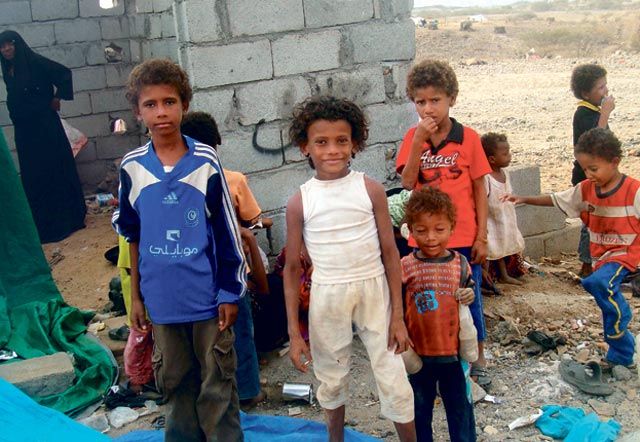Sana'a: The two-week-old Saudi military operation to drive back Al Houthi insurgents into Yemen has exacerbated the humanitarian situation and forced about 3,500-4,000 Yemeni refugees to turn back home.
Saudi authorities had earlier accommodated thousands of Yemenis who fled their homes to escape the fighting when Yemeni government troops launched an offensive against Al Houthi rebels some three months ago.
At the beginning of the Yemeni offensive, the rebels put paid to moves by the war-displaced to relocate to safer areas inside Yemen, forcing them to seek refuge across the border in Al Ghawya, Al Shaneq and Al Khuba regions.
When Al Houthi rebels attacked and took up positions on Al Dukhan, a peak across the border on November 3, Saudi authorities ordered all civilians residing in the border areas to leave for safer areas as they drew up plans to drive out the insurgents.
The clear-out orders left Yemeni refugees in the area with no option but to leave.
Refugees forced to return from Saudi Arabia have been forced to pitch tent outside the over-crowded Al Mazrak refugee camps.
The refugees were not allowed back into the Saudi territories amid suspicions that they could be linked to Al Houthi rebels.
Musfer Ali Ahmad Al Waleb, 45, who fled the Saudi village of Al Ghawya where he had spent three months with his 30-member extended family, said he and all the male members of the group had been detained by Saudi authorities for about 24 hours to ascertain any links to the rebels.
"They thought we were working with Al Houthis although they knew we spent three months in their sponsorship. They allowed only women and children to go by Saudi buses to Al Tiwal, where they were handed to Yemeni authorities in Haradh," he said.
Al Waleb and the other men of his household stayed in Saudi custody from November 6 to 7.
"The Saudi soldiers thought we were cooperating with Al Houthi rebels, some of us were beaten, and we were left alone in the custody without food, we drank only from the taps of the bathrooms," he recalled.
When asked who they blame for their plight, some faulted Al Houthi rebels while others said they were not too sure who was at fault except the fact that they were the ones who were suffering.
"I blame Al Houthis for what's happening to us, they have goals to achieve from our suffering," said the 18-year old Rakan Mohammad Ali.
The 43-year old Ahmad Jar Allah Al Balwi, who is Zaidi, said he relocated from Haidan, one of the most important Al Houthi strongholds, because the rebels had been harassing him and his family after almost every air strike on Haidan. "They said we gave information to the troops to strike their hideouts," he said.
Bassam Mohsin Jar Allah, 66, said the government was to blame for the state of affairs. "I blame the Yemeni government for this war, it is the government who made this war long; every round of war, the government was ending up with a deal in favour of Al Houthis who were getting stronger and stronger in every round."
Ahmad Abdullah Al Manjashi, 55, along with eight members of his family are staying in a small tent outside the overcrowded Al Mazrak relief camp.
Al Manjashi said the family had not received any food or other supplies from the camp and had been told to wait despite registering with officials at the camp. He added that his family had had to move its location four times in three months.













